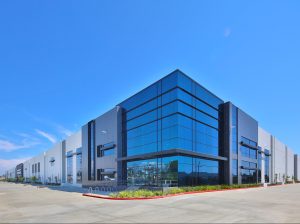Bridge Industrial Completes Long Beach Warehouse Project
The new facility was built on the site of a former asphalt refinery.
Bridge Industrial announced it has finished construction on a Class A industrial facility in Long Beach, Calif. Named Bridge Point Long Beach, the 416,000-square-foot warehouse is already preleased to a transportation and logistics provider for the U.S. Postal Service.
The development firm acquired the site, which formerly housed an asphalt refinery, in 2019. The same year, Bridge received approval from the City of Long Beach Planning Commission for the $84 million project. The development involved demolishing the decommissioned factory, as well as environmental remediation of the site, overseen by the Southern California Regional Water Quality Control Board and the South Coast Air Quality Management District.
READ ALSO: Industrial Construction Ramps Up
According to CommercialEdge data, Bridge Industrial received a $40 million construction loan for the project in 2020, provided by CIBC Bank USA, with a due date of May 2023. The developer hired Oltmans Construction Co. as general contractor for the project and Herdman Architecture and Design Inc. for architectural services.
A supply-constrained location
Bridge Point Long Beach is located at 2400 E. Artesia Blvd., on a 17.2-acre lot just south of Artesia Freeway (State Route 91). The warehouse complex features 36-foot clear ceiling heights, two grade-level and 53 dock-high loading doors, ESFR sprinklers and a solar-ready roof. The building also includes 21,000 square feet of dedicated office space and offers roughly 453 parking stalls, of which 104 have EV charging capabilities, and 61 trailer parking stalls.
The future tenant of Bridge Point Long Beach will begin its operations in September. The developer has previously stated that the facility will create roughly 500 permanent jobs, prioritizing residents of Long Beach.
Port markets like Los Angeles continue to see a heightened demand for quality industrial and logistics space. As such, Los Angeles has had one of the fastest rates of rent growth in the nation, up by 6.4 percent year-over-year as of July, the latest CommercialEdge report shows. The average rent reached $10.31 per square foot in the metro, well above the national average of $6.31.
The Inland Empire had the fastest rent growth, rising 6.9 percent year-over-year. Vacancy rates for industrial properties in Los Angeles and the Inland Empire are also some of the lowest in the nation, at 3.4 percent and 1.4 percent, respectively, as of July.
Sustainable redevelopment
Bridge Industrial partnered with the City of Long Beach to hasten the entitlement process. The project falls within a larger effort by the city to revitalize Artesia Boulevard. A $20 million project along the entirety of the boulevard is set to break ground this winter, according to a report from the Long Beach Post News. City planners have so far secured $12 million, with $8 million yet to be allocated.
Bridge Industrial’s project included the addition of more than 1,200 linear feet of trees and landscaping on Artesia Boulevard, while also funding a new bike lane. The developer also committed to a $250,000 benefits package to support local community initiatives in North Long Beach.
As part of the environmental remediation process at the ex-refinery site, Bridge Industrial removed several tons of oil tanks and steel from the property. The developer also installed an environmental remediation system that will ameliorate the property over time.
In a recent interview with Commercial Property Executive, Steve Poulos, Founder & CEO of Bridge Industrial, said the company is aiming for new development and acquisition opportunities in its core markets, leveraging multiple investment strategies.
Recently, Bridge Industrial set its eyes on a potential 700,000-square-foot development in San Jose, Calif., where it acquired three properties for $134 million. In Chicago, the company bought more than 86 acres in the O’Hare submarket, where it plans to construct a 1.5 million-square-foot industrial campus.








You must be logged in to post a comment.